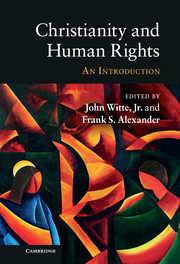Book contents
- Frontmatter
- Contents
- List of contributors
- Acknowledgements
- The first word: to be human is to be free
- Introduction
- FOUNDATIONS AND DEVELOPMENTS OF HUMAN RIGHTS
- CHRISTIANITY AND THE MODERN HUMAN RIGHTS FRAMEWORK
- 9 The human rights system
- 10 The image of God: rights, reason, and order
- 11 Religion and equality
- 12 Proselytism and human rights
- 13 Religious liberty, church autonomy, and the structure of freedom
- 14 Christianity and the rights of children: an integrative view
- 15 Christianity and the rights of women
- 16 Christianity, human rights, and a theology that touches the ground
- 17 A right to clean water
- The final word: can Christianity contribute to a global civil religion?
- Biblical index
- Index
The final word: can Christianity contribute to a global civil religion?
Published online by Cambridge University Press: 05 June 2012
- Frontmatter
- Contents
- List of contributors
- Acknowledgements
- The first word: to be human is to be free
- Introduction
- FOUNDATIONS AND DEVELOPMENTS OF HUMAN RIGHTS
- CHRISTIANITY AND THE MODERN HUMAN RIGHTS FRAMEWORK
- 9 The human rights system
- 10 The image of God: rights, reason, and order
- 11 Religion and equality
- 12 Proselytism and human rights
- 13 Religious liberty, church autonomy, and the structure of freedom
- 14 Christianity and the rights of children: an integrative view
- 15 Christianity and the rights of women
- 16 Christianity, human rights, and a theology that touches the ground
- 17 A right to clean water
- The final word: can Christianity contribute to a global civil religion?
- Biblical index
- Index
Summary
I will begin with two caveats. I have decided to leave the bulk of this chapter as it was written in 2007, representing the atmosphere in the United States and the world at a time we considered “normal,” and then in conclusion append a brief discussion of how later events have forced a change in everyone's thinking. Second, I have cited Christianity in my title because it is the religion with whose impact on global culture I am most concerned here, but I do not mean to privilege Christianity. A genuine global cultural consensus will need the contribution of all the religions.
In my essay “Civil Religion in America,” first published in Daedalus in 1967, I discussed toward the end the possibility of what I called a “world civil religion.” Naive though it may sound today, the idea of a world civil religion as expressing “the attainment of some kind of viable and coherent world order,” was the imagined resolution of what I then called America's third time of trial (the first time was concerned with independence; the second with slavery), an idea later developed in my book The Broken Covenant. The third time of trial, as I then put it, was concerned with America's place in the world, and indeed what kind of world it would have a place in. That “viable and coherent world order” for which I hoped, would, I believed, require “a major new set of symbolic forms.
- Type
- Chapter
- Information
- Christianity and Human RightsAn Introduction, pp. 351 - 366Publisher: Cambridge University PressPrint publication year: 2010



